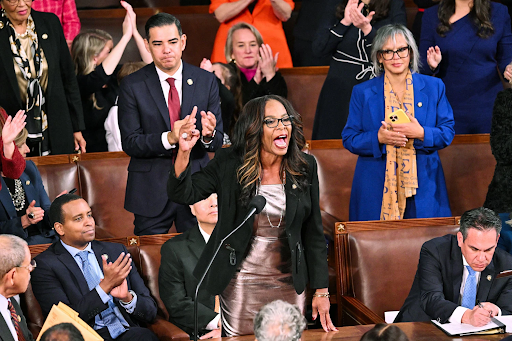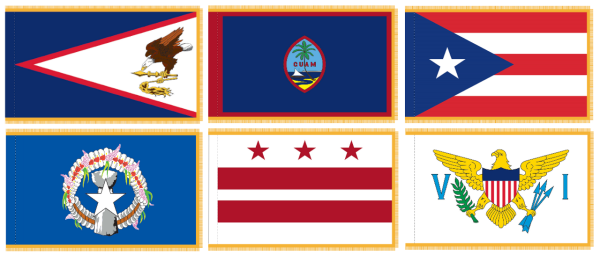Four-and-a-half million Americans live in the U.S. territories and the District of Columbia. That’s four-and-a-half million Americans that – according to House of Representatives Rules – do not have a voting member in Congress.
On January 3rd, 2025, the House of Representatives had to elect a new Speaker of the House for the 119th Congress which will pass laws, budgets, and continue investigations and committees through January 2027.
It was at that session of the House of Representatives in which Stacey Plaskett, the Delegate – or non-voting Representative – from the U.S. Virgin Islands was recognized:
“Speaker, I have a parliamentary inquiry. I note that the names of the Representatives from the American Samoa, Guam, Northern Mariana, Puerto Rico, the Virgin Islands, and the District of Columbia were not called — representing collectively four million Americans. Mr. Speaker, per capita the most veterans [in America].”
Her comments were met by loud applause, largely by the Democratic Party caucus with some support — but largely silence or jeers — from members of the Republican Party caucus.
The gentlewoman was recognized again and, again, asked why the Representatives were not called. The House Parliamentarian, Jason Smith, who was presiding over the session in the stead of a proper Speaker, explained that:
“Delegates-elect and the Resident Commissioner-elect are not qualified to vote. Representatives-elect [of the fifty states] are the only individuals qualified to vote in the election of a Speaker, as provided in Section 36 of the House Rules and Manual.”
Representative Plaskett responded by saying:
“This body and this country has a territories and colonies problem. What was meant to be temporary has effectively become permanent.”
She is referring to the centuries-long arrangement that the five populated territories and the District of Columbia have had with the U.S. federal government and Congress:
Although the people living in these territories are U.S. citizens, they may not vote for President in the General Elections nor can their representatives to the House of Representatives vote on bills’ passage on the House floor.
The territories and D.C. do not have any representation in the Senate – voting or non-voting. Prior to 1970, most of the territories did not have any representation at all in Congress.
I asked AP American Government teacher, Isaac Farhadian, about why the territories can’t vote meaningfully and if there’s a possibility that the House Rules may change – or if statehood is the only way for these four-and-a-half million Americans to be truly represented on a national level.
“For the elections, it’s a Constitutional issue. The way the [general electoral system] works makes it where the territory has to be a state to have power in selecting the President. The exception is Washington, D.C., which has its own amendment in the Constitution giving it the same amount of electoral votes as the smallest state.”
“As it stands now, the territories would have to either become states or changes would have to be made to the Constitution to get better representation and power. Puerto Rico has a lot of talk about it becoming a state, but until then the voting power of territorial representatives is mostly symbolic.”
Puerto Rico and the District of Columbia (which would be renamed to the Douglas Commonwealth) already have strong cases and large amounts of support for their statehood in and out of their borders.
The territories are currently split 3-3 with half of the delegates being affiliated with the Republican Party and the other three with the Democrats.
Observers online and in the media have commented that Representative Plaskett’s plea for her people to be heard reflects generations of American imperialism, especially as her mic was muted as she continued to speak. She outcried, being heard on another mic:
“But I have a voice!”
So, we must ask ourselves if we as Americans stand by – as D.C.’s license plates say – “No taxation without representation”?
(Left-right, top row then bottom row: The flags of American Samoa, Guam, Puerto Rico, the Northern Mariana Islands, the District of Columbia, and the U.S. Virgin Islands.)

